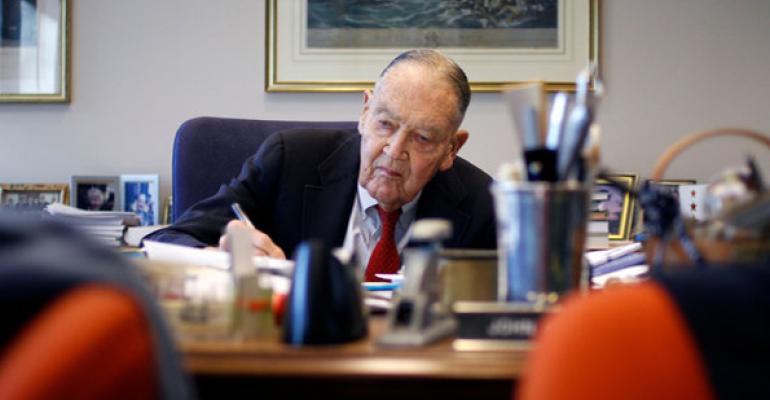Jack Bogle, founder and former chairman of the Vanguard Group, said Wednesday he’s optimistic that a fiduciary standard for advisors will get passed, but it may be worth compromising some of the details of the plan in order to do so.
“I’m pretty sure that what will come out of all of this is a fiduciary standard for registered investment advisors and broker/dealers,” Bogle said on Wednesday during the Institute for the Fiduciary Standard's media briefing.
But that doesn’t mean that the current proposal is perfect. Bogle said the Dept. of Labor's rule, as currently written is “a little overly complex” and it can simplified, generalized and more principles-based.
“I think what we want to do here is establish the principle; let’s get it down somehow. If we have to concede certain points along the way to get there, I for one, would concede them, depending on the points,” Bogle said, noting that while the principals cannot be compromised, but perhaps issues like recordkeeping requirements could be.
Some of the changes sought by the industry on the Labor Department’s fiduciary proposal are necessary, Bogle said, “and presumably will be accommodated.”
But it is being “nibbled to death by the fund industry and the lobbyists who argue the industry is already putting the client first.”
“They don’t realize that there’s this bar, this second conflict of interest inherent in their own profitability,” he said. “That’s why Vanguard is a mutual fund company that is owned by its own shareholders and lacks the kinds of conflicts of interest that others in the industry face when they’re owned by public stockholders, or even worse, when they’re owned by a financial conglomerate.” He added 40 of the largest 50 mutual fund companies have this conflict. “They basically have two masters, the company and the fund.”
Bogle called out competitor T. Rowe Price, and senior advisor and retired vice chairman James Riepe, who was sitting near Bogle on the panel. “T. Rowe has been an enormously profitable stock, unbelievable—far better than their funds could ever do. And their managers have prospered, not necessarily by owning the funds they manage, but by owning the management company."
“So the industry thinks they’re doing right and costs are below average. But costs are still very high, higher than when I first entered this industry in 1951,” Bogle says.
In the end, a fiduciary standard—be it through the Labor Department or the SEC—is going to be a fight, he says. But he remains optimistic.
“A fiduciary standard for investment advisors and brokers just has to be how this business is run. It’s the honorable way to run a business,” Bogle says. “I’m highly confident that we can get down in writing what we all know in our hearts is the right thing to do.”





